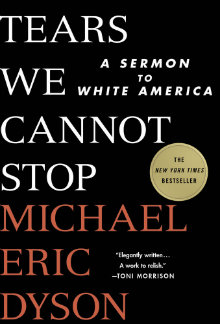A Tool to Understand and Counter White Privilege
Tears We Cannot Stop: A Sermon to White America
By Michael Eric Dyson
(St. Martin’s Press, 2017 – Learn more)

“Black and white people don’t merely have different experiences; we seem to occupy different universes…The merchants of racial despair easily peddle their wares in a marketplace riddled by white panic and fear. Black despair piles up with each body that gets snuffed on video and streamed on social media” (p. 3).
Michael Eric Dyson’s Tears We Cannot Stop: A Sermon to White America may look like a slim volume, but each of its 240 pages is thick and thought provoking. Dyson, a self-proclaimed “scholar, a cultural and political critic, and a social activist” (p. 4), shares that he is, before any of those things, a Baptist minister.

Dyson warns that his sermon might frighten and anger white readers, but he implores that we bear with him and listen because, before we can break the chains of racism, we must “make whiteness give up its secrets” and explore the “privilege and power connected with it” (p. 46).
Our nation is besotted by a resurgence of overt racial prejudice – fueled, at least in part, by the systematic racism that fills every crack of our lives. Sadly many white Americans refuse to educate themselves about the pervasive and all permeating racism that manifests in white privilege.
Dyson helped me understand some things that I thought I already understood. He helped me to more deeply see the privilege I enjoy because of my white skin, and he helped me to see my role in propagating that privilege.
He preaches about why Kaepernick chose to kneel, why the N word is a blight, the facility of focusing on “black-on-black” crime, the importance of the Black Lives Matter movement, and, movingly, the difference between patriotism and nationalism. The key difference being that true patriots love their country enough to criticize and try to correct its wrongdoings while a nationalist “spurns such correction and would rather take refuge in bigotry than fight it. It is the nationalists who wrap themselves in a flag and loudly proclaim themselves as patriots” (p.118).
Dyson challenges white Americans to be true patriots by confronting their privilege and then refusing it. He calls on white America to step up and join black America in the fight against racism. He pushes white folk to protest and to protect and love our black brothers and sisters and to start by “setting out immediately to find and make friends with black folk who share their interests.” (p. 207) This is important, he explains, because the “more black folk you know, the less likely you are to stereotype us. The less you stereotype us, the less likely you are to fear us. The less you fear us, the less likely you are to want to hurt us, or to accept our hurt” (p. 118).
In a post for my MiddleWeb blog, Heart of the School, I wrote a piece in response to a racist march in Charlottesville that turned deadly. Eight Ways Teachers Can Fight Hate and Injustice explores how teachers can use a social justice lens to combat racism. In that blog, I implore teachers to educate themselves so that they can educate their students. Honestly, I can think of no better place to start than by reading Tears We Cannot Stop.
Rita Platt (@ritaplatt) is a National Board Certified teacher with master’s degrees in reading, library, and leadership. Her experience includes teaching learners in remote Alaskan villages, inner cities, and rural communities. She currently is a teacher-librarian, teaches graduate courses for the Professional Development Institute and writes for We Teach We Learn.


































